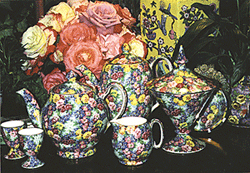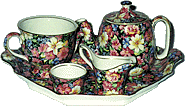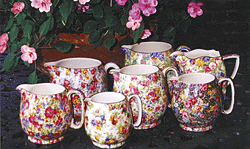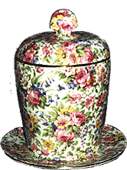|
A
Flower Garden All Year Round

Collecting
Story by Kathy
Wagstaff
 Collecting
colorful Chintz China has become a cheerful
preoccupation for many and members of the Chintz
Collectors' Club have the patterns to prove
it. With hundreds of collectors and dealers
from the United States, Canada, England, Australia
and New Zealand, this association is quickly
growing along with the popularity of the china.
Last year the club was named the "Fastest
Growing Collectors' Society of the Year,"
by West Coast Peddler Magazine. Collecting
colorful Chintz China has become a cheerful
preoccupation for many and members of the Chintz
Collectors' Club have the patterns to prove
it. With hundreds of collectors and dealers
from the United States, Canada, England, Australia
and New Zealand, this association is quickly
growing along with the popularity of the china.
Last year the club was named the "Fastest
Growing Collectors' Society of the Year,"
by West Coast Peddler Magazine.
Chintz
China, manufactured in the 1920's to the late
60's, is named after the colorful patterns printed
on cotton fabric in India in the late 17th century.
Although the brilliant earthenware was originally
produced for daily use and was inexpensive,
the intricate designs painted on by hand has
brought the china to new heights and new prices.
This
summer, the well known Christie's South Kensington
Auction House in London will hold an auction
devoted entirely to chintz. Complete sets can
bring thousands of of dollars.
 At
last year's Chintz Convention in Florida, a
live auction revealed the rising values of chintz.
A unique Royal Winton "Julia" teapot
brought $4,200; a Royal Winton "Florence"
breakfast set sold for $3,200; a Royal Winton
"Welbeck" breakfast set was worth
$3,000 and a Royal Winton "Sunshine"
lamp sold for $1,700. At
last year's Chintz Convention in Florida, a
live auction revealed the rising values of chintz.
A unique Royal Winton "Julia" teapot
brought $4,200; a Royal Winton "Florence"
breakfast set sold for $3,200; a Royal Winton
"Welbeck" breakfast set was worth
$3,000 and a Royal Winton "Sunshine"
lamp sold for $1,700.
Formed
just four years ago for collectors and dealers
of chintz, the club hosts an annual convention
in the United States and also an international
convention. The goals of the Chintz Collectors'
Club is to keep its members informed about developments
in the world of chintz. Advice on purchasing
high quality chintz, news of popular patterns
and their availability, dealer profiles and
free advertisements are some of the perks available
to the collector or dealer through the quarterly
newsletter.
 Co-Presidents
Jane Fehrenbacher and Carolyn Fox have been
working for months on the annual convention
set to open in Pasadena, CA, in late April.
An auction of rare chintz, educational workshops,
tables of chintz for sale and tours of homes
filled with the unique china will be featured. Co-Presidents
Jane Fehrenbacher and Carolyn Fox have been
working for months on the annual convention
set to open in Pasadena, CA, in late April.
An auction of rare chintz, educational workshops,
tables of chintz for sale and tours of homes
filled with the unique china will be featured.
"We
are all very excited about the convention and,
by the way, collecting chintz has grown in popularity,"
said Fehrenbacher. "Belonging to the club
is a wonderful way to network with other chintz
collectors and to obtain valuable information
about the chintz world as well as to buy and
sell chintz."
Dues
for the club cost $40 each year which entitles
the member to receive a high quality newsletter
filled with information and colored photographs.
In addition to The Chintz Collectors' Club,
an international club which focuses on Royal
Winton, is available to collectors and dealers.
 Located
in England, The Royal Winton International Collectors'
Club costs $50 in annual fees and provides a
bi-monthly newsletter which offers information
on Royal Winton as well as other chintz patterns. Located
in England, The Royal Winton International Collectors'
Club costs $50 in annual fees and provides a
bi-monthly newsletter which offers information
on Royal Winton as well as other chintz patterns.
Chintz
is wonderfully varied with more than 200 beautiful
patterns. "Four of the major and most sought
after producers in England were Royal Winton,
Lord Nelson Ware, James Kent Ltd., and Crown
Ducal," said
Fehrenbacher.
"The production of chintz did require an
amazing amount of handwork because the designs
were transferred by hand from lithographs on
to the individual piece. The knowledge that
a young woman spent hours placing the transfer
patterns on each piece of chintz makes that
much more appreciative of the treasure."
 The
process, which resembles the application of
a decal, required meticulous cutting and matching
to ensure that the joins of each piece were
practically invisible. Gilding the piece of
china by hand was completed before firing. The
process, which resembles the application of
a decal, required meticulous cutting and matching
to ensure that the joins of each piece were
practically invisible. Gilding the piece of
china by hand was completed before firing.
Complete
dinner sets, tea pots and coffee pots , bud
vases and serving pieces are all collectible.
Some collectors focus their search for a single
pattern. Others enjoy mixing and matching the
colorful designs.Still others will only collect
tea cups in as many patterns as possible. With
names like "June Roses," "Heather"
and "Sweet Pea," the colorful patterns
evoke a feeling of fresh Spring breezes and
English Gardens.
 Club
members recommend reading about chintz and becoming
knowledgeable about the china before making
big purchases. There are imitations and damaged
chintz on the market. Four books recommended
for reading are: The Charlton Standard Catalog
of Chintz, second edition, by Linda Eberle and
Susan Scott, The Charlton Press, 1977;
Chintz by Design, Bonnie Heller& Felijoy,
Chintz International, LLC, 1997; Collecting
Royal Winton Chintz, Muriel M. Miller, Francis
Joseph Publications, 1996 and Chintz Ceramics,
JoAnne P. Welsh, Schiffer Publishing Ltd., 1996. Club
members recommend reading about chintz and becoming
knowledgeable about the china before making
big purchases. There are imitations and damaged
chintz on the market. Four books recommended
for reading are: The Charlton Standard Catalog
of Chintz, second edition, by Linda Eberle and
Susan Scott, The Charlton Press, 1977;
Chintz by Design, Bonnie Heller& Felijoy,
Chintz International, LLC, 1997; Collecting
Royal Winton Chintz, Muriel M. Miller, Francis
Joseph Publications, 1996 and Chintz Ceramics,
JoAnne P. Welsh, Schiffer Publishing Ltd., 1996.
Chintz
is one of the hottest collectibles, says Fehrenbacher.
So open those cabinets and china closets and
take a closer look at that china. There may
be surprises inside.
1999
|